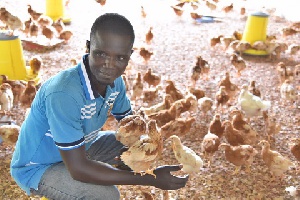Owners of birds such as poultry and livestock, have been urged to be extra vigilant in caring for their animals, in order to prevent infections. This is because diseases like bird flu and anthrax, are often the result of neglect and inadequate care, as well as failure to take the needed steps to prevent disease outbreaks.
Dr. Kwadwo Obeng-Wiredu, Deputy Director, Greater Accra Metropolitan Assembly, Ghana Veterinary Service, told the Ghana News Agency that with Anthrax for example, it was hardly possible to have an infection get into a farm, unless an infected animal from elsewhere made contact with an animal on the farm.
He said farmers had to be vigilant concerning people as well as animals entering their farms, because humans could bring in infections if they may have come into contact with infected animals, whilst foreign animals entering the farms could be infected.
Dr. Obeng-Wiredu said currently, there had been no reported cases of any animal disease outbreaks, whilst outbreaks in the past had been well-contained. He said whilst these diseases could be transmitted to humans, the country had been fortunate not to have had any human related deaths so far.
“We only ask farmers to be observant with the basic security measures we have taught them such as washing their hands after touching birds that do not belong to their farms as well as sick and dead ones, burying dead birds and confining their birds and animals,” Dr. Obeng Wiredu said.
He said farmers should wear gloves when handling dead or sick birds and animals, and be continually aware of the need to maintain good practises that minimised the possibility of disease outbreaks. Dr. Obeng-Wiredu touched on rabies and said whilst there was not an outbreak of the disease, isolated cases happened once in a while.
He said regardless of whether a dog had been vaccinated or not against rabies, a person had to report to a certified veterinarian as soon as possible, after being bitten by a dog.
Dr. Obeng-Wiredu observed that that administering basic first-aid to a dog bit wound was not at all enough, but necessary. He said it was crucial to consult a qualified veterinarian as soon as possible, in order to ensure that a dog bite victim was safe from rabies infection.
Once bitten by a rabid animal, there is an incubation period of between ten days to one year, but an average of a few weeks to about two months is typical.
The rabies virus attacks the central nervous system, right through to the brain and typically results in death.
Vaccinating dogs against rabies, while confining them, safe and away from stray and unknown dogs, is a key preventive measure in the fight against rabies.
Humans should also avoid contact with animals, especially dogs that do not belong to them, in order to avoid rabies infection.
General News of Thursday, 25 April 2019
Source: ghananewsagency.org

















